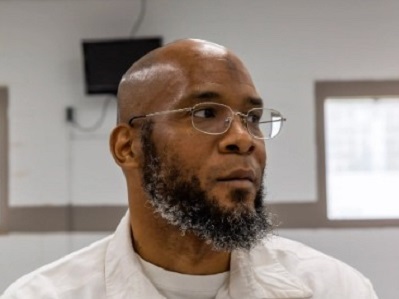
Marcellus Williams’ life remains at risk for a crime he did not commit. Credit: Marcellus Williams’ legal team via The Innocence Project
Marcellus Williams, who faces execution in Missouri despite DNA evidence proving his innocence, has filed a civil lawsuit against Governor Mike Parson for dissolving the board of inquiry that had been investigating his innocence claim before it could produce a report and recommendation, and against Attorney General Andrew Bailey for moving to set an execution date after the governor had illegally dissolved the board.
The suit, filed in Missouri’s 19th Circuit Court, asks the court to invalidate Parson’s June 30 executive order dissolving the board and lifting Williams’ stay of execution, arguing that the governor violated Williams’ rights and the law when he dissolved the board without a report and recommendation.
In an unprecedented move earlier this summer, Parson rescinded an executive order issued by his predecessor, effectively lifting Williams’ stay of execution and terminating a board of five former judges appointed by previous Eric Greitens to examine the new DNA evidence — which no court has ever reviewed. Greitens issued the executive order pursuant to Missouri Revised Statutes section 552.070, a law passed in 1963 designed to protect innocent people from being wrongfully executed. The statute permits the governor to empanel a board of inquiry to review evidence of innocence in a death penalty case, an action taken only three times by Missouri governors since its passage. Greitens’ 2017 executive order required the board to provide him with a report and recommendation about Williams’ claims of innocence and application for clemency. The lawsuit alleges that Parsons never received such a report or recommendation from the board before he dissolved it.
“The dissolution of the board of inquiry before a report or recommendation could be issued means that, to date, no judge has ruled on the full evidence of William’s innocence,” said Tricia Rojo Bushnell, executive director of the Midwest Innocence Project, which represents Williams. “Knowing that, the state of Missouri still seeks to execute him. That is not justice.”
“The board of inquiry statute was created so that an independent group of retired judges had an opportunity to review all the evidence in a death penalty case, without any procedural or political obstructions, to make sure an innocent man or woman is not executed. It’s a unique, fail-safe protection. By aborting the process before this distinguished group of jurists issued a report, Parson violated Williams’ due process rights under the state and federal constitutions to life and liberty,” said Barry C. Scheck, co-founder of the Innocence Project.
Williams has spent 24 years of his life on death row for the 1998 murder of Felicia Gayle, a former St. Louis Post-Dispatch reporter who was stabbed 43 times in her home. Although no physical evidence or crime scene evidence connected him to the crime, his conviction primarily relied upon the testimonies of two incentivized witnesses, whose statements were inconsistent with the crime scene evidence, with their own prior statements, and with each other.
In 2016, post-conviction DNA testing conducted on the handle of the knife lodged in Gayle’s neck detected the presence of male DNA and definitively excluded Williams as the source. That evidence has been reviewed and analyzed by three renowned DNA experts, all of whom concluded that Williams is not the source of the DNA. Furthermore, Williams was excluded as the source of the hairs found near Gayle’s body and as the source of bloody footprints found inside the house near the body.
Based on this new DNA evidence, Greitens stayed Williams’ execution in 2017, and formed the board of inquiry to examine it. When Parson dissolved the board without receiving its report and recommendation about Williams’ case, he violated the statute, defied the executive order, exceeded his authority, and undermined Williams’ rights.
“There is clear and convincing evidence that Marcellus Williams did not murder Gayle. It would be a terrible tragedy for the state to execute Williams before the board of inquiry completed its commission to make a report and recommendation to the governor as to whether or not Williams should be executed,” said Charles Weiss, a partner at Bryan Cave Leighton Paisner, which represents Williams.
Williams is represented in this filing by Bryan Cave Leighton Paisner (Charles Weiss), the Midwest Innocence Project (Tricia Rojo Bushnell, Rachel Wester, Blair Johnson, Leigh Ann Carroll); and the Innocence Project (Adnan Sultan, Barry Scheck, Tim Gumkowski, Hannah Freedman, and Cecily Burge).
More background available here.
Republished courtesy of The Innocence Project.